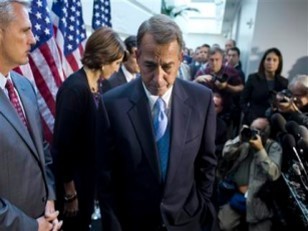WASHINGTON (AP) -- The divided government's increasingly urgent drive to prevent a Treasury default and end a 15-day partial government shutdown took a highly partisan turn Tuesday as House Republicans unveiled a proposal stocked with conservative priorities that the White House instantly rejected.
It was unclear whether House Speaker John Boehner and the GOP leadership had the votes to pass their measure, or whether it would even be brought to the House floor for a vote. Even so, the immediate result was to freeze Senate negotiations on a bipartisan compromise that had appeared ready to bear fruit.
The events prompted an outbreak of partisan rhetoric, mixed with urgent warnings that both the U.S. and global economies could suffer severe damage quickly unless Congress acted by Thursday.
Even something of an appeal for heavenly aid was thrown in, as Rep. Steve Southerland of Florida led House Republicans in a rendition of "Amazing Grace" at the beginning of a rank-and-file meeting called to discuss a way out of the impasse.
Describing his plan for reporters, Boehner said, "I have made clear for months and months that the idea of default is wrong and we shouldn't get anywhere close to it." Hinting at a lack of support from some fellow Republicans, he declined to predict that the measure would come to a vote by day's end.
Moments later, without naming names, White House spokeswoman Amy Brundage said the House GOP proposal was designed to "appease a small group of tea party Republicans who forced the government shutdown in the first place. Despite its tone, the statement stopped short of a veto threat.
As described by officials, the House GOP proposal would give the Treasury authority to borrow normally through Feb. 7 and reopen the government with enough money to last until Jan. 15.
It would also suspend a medical device tax that is part of "Obamacare," a health care law that Republicans universally opposed when it passed Congress. In addition, it would impose tougher income verification standards on individuals who apply for federal subsidies provided for coverage.
As originally presented to the rank and file, the leadership's plan also stripped the president, vice president, members of the Cabinet and lawmakers of the standard employer contribution toward health care insurance, in their case, money from the government.
Officials said that in a move to pick up support from dissatisfied conservatives, that provision was expanded to cover aides to members of Congress as well. It could raise the out-of-pocket expense for health care coverage by thousands of dollars annually for individuals and families who are affected.
Not all Republicans sounded persuaded.
Rep. Walter Jones, R-N.C., said he was not sure he could vote for the plan because it did not take steps to reduce the accumulation of federal debt. "I have to know a lot more than I know now," he said.
Democrats jumped on Boehner and the plan he produced.
In unusually personal remarks, Senate Majority Leader Harry Reid said the Ohio Republican had "once again tried to preserve his role at the expense of the country."
That was too much for some Republicans who have been among those most vocal in calling for a bipartisan solution to the impasse.
"It's piling on and it's not right," Sen. John McCain, R-Ariz., said of the response from the Democrats. "To categorically reject what the House and the speaker are doing - and I think he's pretty courageous in what he's doing - in my view is not serving the American people."
The House had been effectively sidelined in recent days as Reid and Senate Republican Leader Mitch McConnell engaged in intense negotiations to reopen the government and raise the debt limit.
That changed emphatically when details began circulating of some of the elements of the terms under discussion.
In addition to ending the shutdown and raising the debt limit, the two Senate leaders were considering a plan to delay a $63-per-person fee that Obamacare would impose on anyone who receives health care coverage under an employer-provided plan.
Some Republicans balked, complaining that was a concession to labor unions who are among the Democrats' most loyal political supporters.
Many unions have announced their opposition to the fee, but so, too, have businesses.
Reid and McConnell also have been discussing provisions to give federal agencies flexibility in adjusting to across-the-board spending cuts imposed under legislation that Obama signed in 2011.
Another element of their negotiations would call for House-Senate negotiations on a possible deficit reduction measure to take the place of the across-the-board cuts.
Friday
April 26th, 2024
3:31AM









